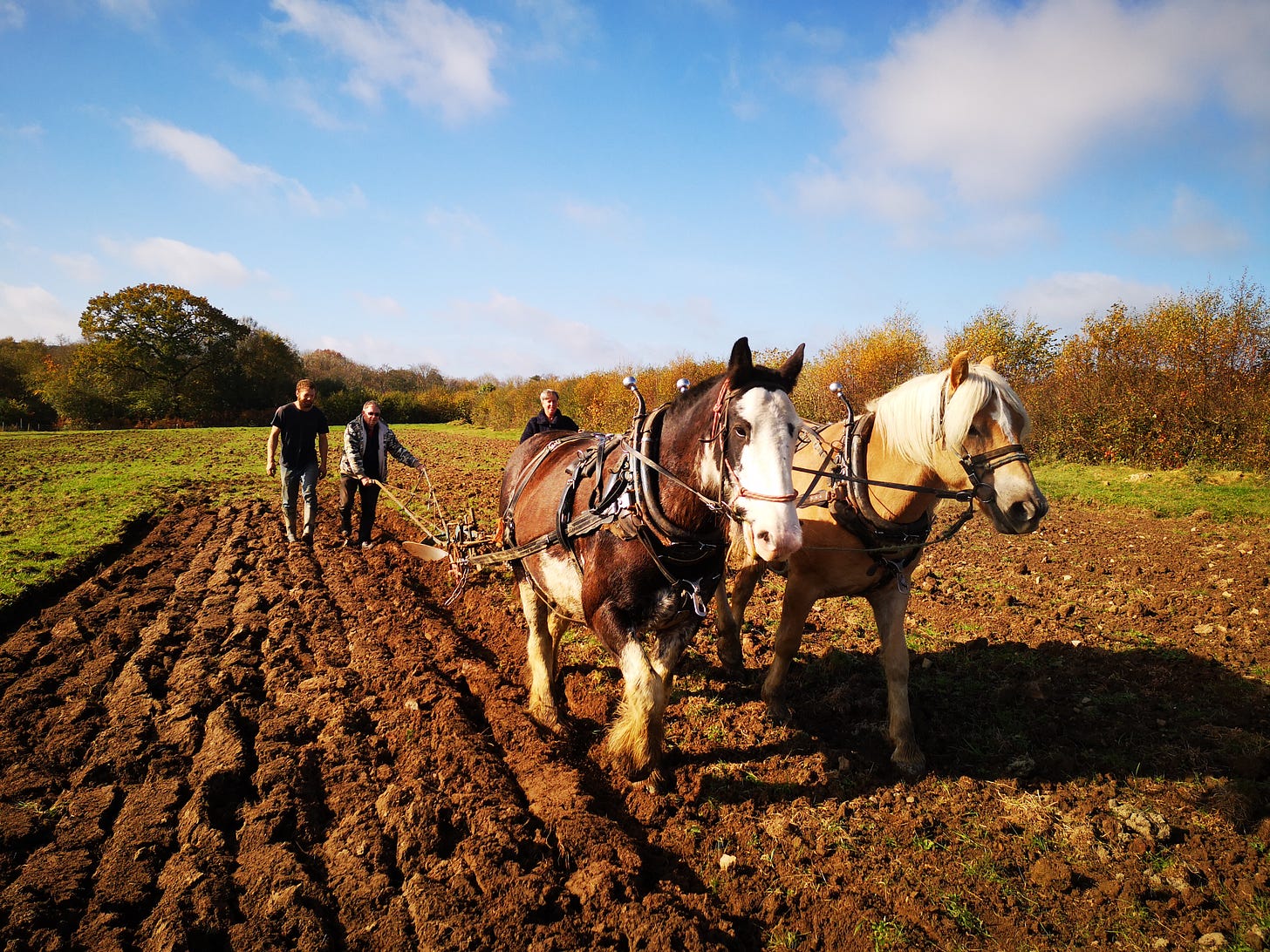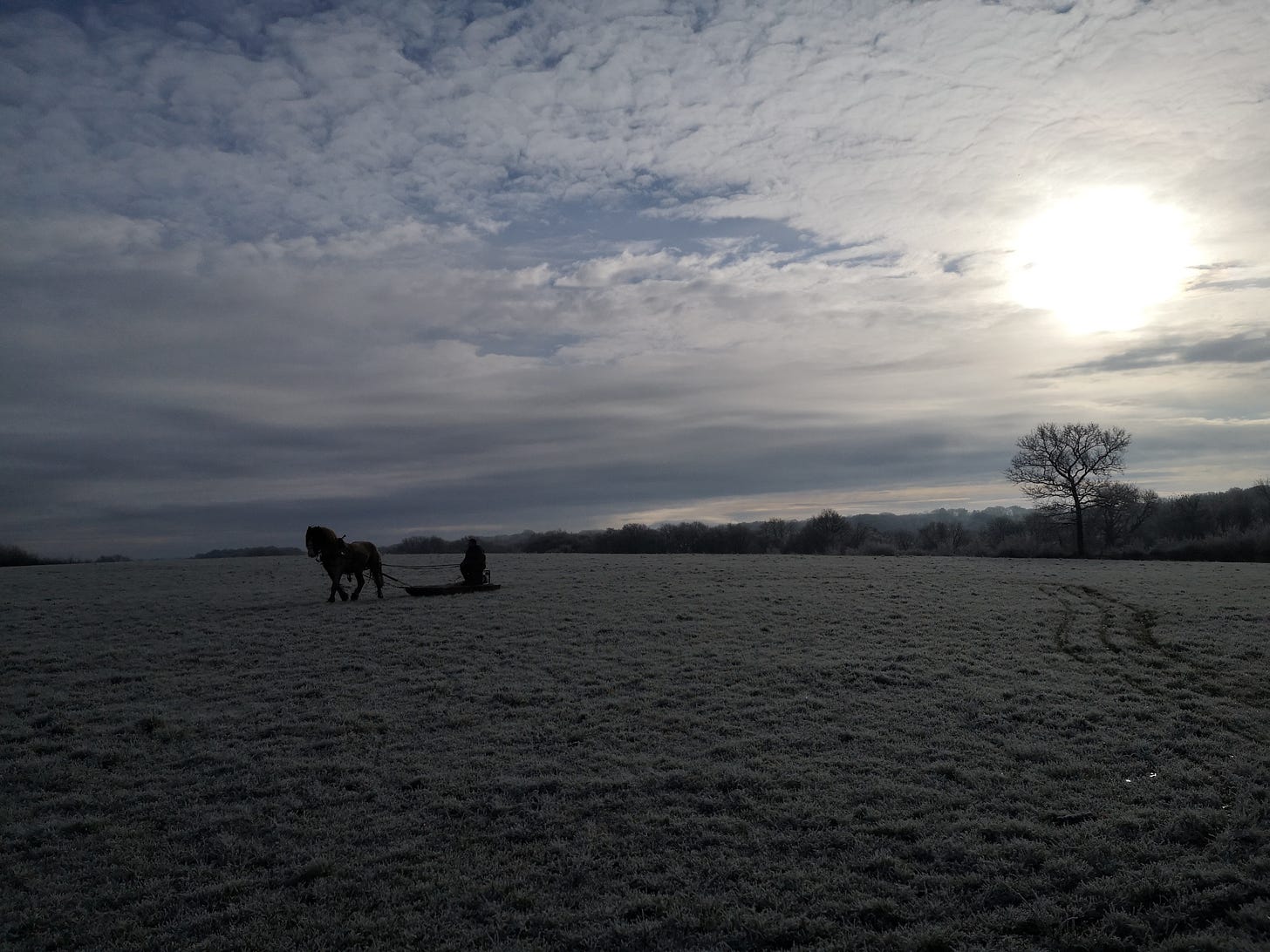Meet the Paddocks, the farmers still using horse power
Swapping tractors for horses has improved soil quality on this Dartmoor farm – but is it a financially viable alternative to the current model of agriculture?
Welcome to Inkcap, a newsletter about nature, ecology and conservation in the UK.
This is your Wednesday feature. You can still read last Friday’s digest: Polluted Rivers & Lost Forest.
By Ginger Clark
It’s haymaking time at Hitch In Farm.
The fresh smell permeates the warm summer’s air, accompanied by a sound not dissimilar to that of a sewing machine: it’s an old horse-drawn mower working its way from the outside of the field inwards. As it reaches the middle, with the final cut, it sends up a flurry of butterflies. This is one of Ellie Paddock’s favourite moments of the year.
When Ellie and Mike Paddock set up Hitch In Farm in 2015, it could barely be classified as a farm. “There was literally nothing here; there wasn't even fencing. It was a field, rather than a farm,” says Ellie.
Since then, Hitch In Farm has been transformed. Located on the edge of Dartmoor, the 35-acre working farm where the Paddocks live off-grid with their young son is now home to a merry band of pigs, hens, goats, a couple of cows and around 20 sheep. But the most important residents are the horses, including Dolly, Hank, Lupin, Melons, Daisy and Rodger.
The Paddocks both had previous experience with horses – Mike used to be head horseman at Prince Charles’ farm in Tetbury – so horse power seemed the natural way to fuel their new operation. Today, there isn’t a tractor in sight: this small herd does everything from hoeing and harrowing to sledging and harvesting.
While horses are still a fairly regular fixture of woodland management in the UK, their use on farms almost died out during the 20th century as operations grew increasingly industrialised. The Paddocks’ neighbours were initially sceptical: “Everyone thought we were just kind of messing around,” says Ellie.
While few statistics are available on the number of working horses in the UK today, the Paddocks aren’t alone in their experiment. Flourish Produce in South Cambridgeshire has been farming with their two horses, Bill and Ben, since 2017; Sillywrea farm in Northumberland also relies on horses for the majority of its work; in Hampshire, the 235 acres of Harbridge farm are ploughed and harrowed using 25 Percherons, an eighth-century breed of workhorse.
Perhaps this continuation of an old tradition is because there are still compelling reasons for farming with horses. The deterioration of the UK’s soil, caused in part by industrial farming, is a cause for major concern. A 2015 study reported that annual soil degradation costs between £0.9 billion and £1.2 billion, with 39 percent of that down to soil compaction. Compression causes the soil to become denser, leading to reduced crop yields, less soil biodiversity and more water run-off.
Some industrial tractors weigh around 20,000 kilograms; the average working horse weighs in at under 1,000. This reduction in weight can make a huge difference to the quality of the soil, as the Paddocks have witnessed.
“I would say we've got more topsoil than we had before and it's less compacted than it was,” says Ellie. “The first year, it took six horses five days to turn over an acre of ground because it was so compacted. Now, if we want to turn it over for an annual crop, it takes us half a day with a team of four.”
Another advantage is that horses do not consume fossil fuels, while they do produce manure. “We can use that to improve our soil, instead of just making horrible fumes,” adds Ellie.
Still, the tractor-versus-horse debate is a complex one. There are many factors that are hard to quantify, such as the time and care required to train a living creature. You cannot simply jump on a horse and turn on the ignition: a teamster needs years of training, as do the horses. A case study from Germany found that soil farmed with horses rather than tractors had better porosity and water retention capabilities – but that farming in this way was more costly than the tractor-based alternative.
Working with horses automatically imposes constraints: there is only so far you can push a living creature, and this requires farms to be smaller and more diverse. Hitch In Farm makes its income by selling both meat and vegetables – the Paddocks are launching a veg-box scheme in spring – alongside horse-related services like logging, and training courses for others who want to work with horses.
“We do a lot of different stuff all year round,” explains Ellie. “That diversity is better for your income, because you've got loads of different pots for when you need money and you're not relying on one thing that might fail.”
This approach has paid off. The couple recently participated in The Prince’s Farm Resilience Programme, which provides business workshops to family farms, where they were shocked to discover that their farm was the most profitable by some way.
Their experience illustrates some of the difficulties faced by farmers across the nation. Government statistics show that only 25 percent of UK farms profited from agriculture between 2015-16 and 2017-18. Another 50 percent made losses on agriculture, but stayed in business thanks to subsidies and diversification. The remaining 25 percent were losing money.
In light of this, Hitch In Farm is making the case that working with horses is not just a romantic rural dream brought to life: it can be a financially viable alternative to industrialised agriculture.
Some of the financial advantages derive from the relatively cheap equipment required. A heavy-duty plough can cost tens of thousands of pounds; the Paddocks picked up their best horse, Dolly, at a meat auction. “We bought her for the equivalent price of what we would have paid for her in burgers,” says Ellie. They have also spruced up second-hand machinery, including equipment they have found discarded in hedgerows.
Even so, Hitch In Farm doesn’t have to rely on antiques. America’s Amish community, which eschews modern technology, can take credit for modern innovations in horse equipment; they showcase their developments each year at their Horse Progress Days.
If anything, the problems don’t so much arise from a lack of machinery as a lack of knowledge. The generation of farmers who knew how to work with horses has died out, and their skills have vanished with them.
The Paddocks have been working to plug this knowledge gap by creating a support network for people who have participated in their courses. These people can exchange ideas with one another, as well as with experts who are willing to help out, in a private Facebook group. Through this community, the couple is creating a conversation that gives horses a place in farming again; in the last five years, they have helped to create 13 farms and enterprises that focus on horse power.
Then there’s the issue of food security: research carried out in Sweden found that working horses, combined with tractors fueled with vegetable oil, could produce enough food for its proportionate share of the world population, without the need for additional fertilisers, chemicals or fossil fuels.
So should farm horses be used more widely, as a solution to the environmental problems caused by modern intensive farming? Ellie believes that, until we move away from industrial agriculture, farming with horses can only be a solution for a select few.
“I'm not sure it'd be a solution for everyone but it certainly is one for us,” says Ellie. “It's not something you can pick up and put down: you have to be passionate about it, because otherwise it's not going to work. There are a lot of people that start out with horses thinking they want to use them and then it turns out to be a lot of work. It has to be in your blood a bit, I think.”
Ultimately, though, it’s the very thing that makes horse power difficult – the fact they are living creatures – that also makes it special. Haymaking may be hard work, but it is founded upon the relationship that the Paddocks have developed with their horses: with Dolly, Hank, Lupin, Melons, Daisy and Rodger.
Inkcap is 100% reader-funded.
If you value independent environmental journalism, please consider supporting Inkcap by becoming a paid subscriber. (If it takes you to the landing page, simply re-enter your email.)
Got a question? You can get in touch by replying to this email, or read the FAQs.
Image credits: Ellie Paddock






From the early 1900s, my Grandfather farmed near Falkirk, then near Kidderminster, then to Angus, and my Dad often talked about the horses on all the farms and could remember all their names.
He told a story (probably told in many farming families) about when my Grandfather got his first tractor. The whole family came out to watch him heading down the field and he was seen to suddenly stand up pulling back on the steering wheel and shouting "Whoa ye bugger. Whoa" as he and the tractor went through the hedge.
Well done for getting going with horses. Some 30 years ago I wrote a serious of articles in Heavy Horse magazine about the jobs that horses can do more efficiently than tractors, and we have used our competitive horses to work the land for over 40 years now and we have now have a demonstration farm on Exmoor trying to encourage others to do similar things.